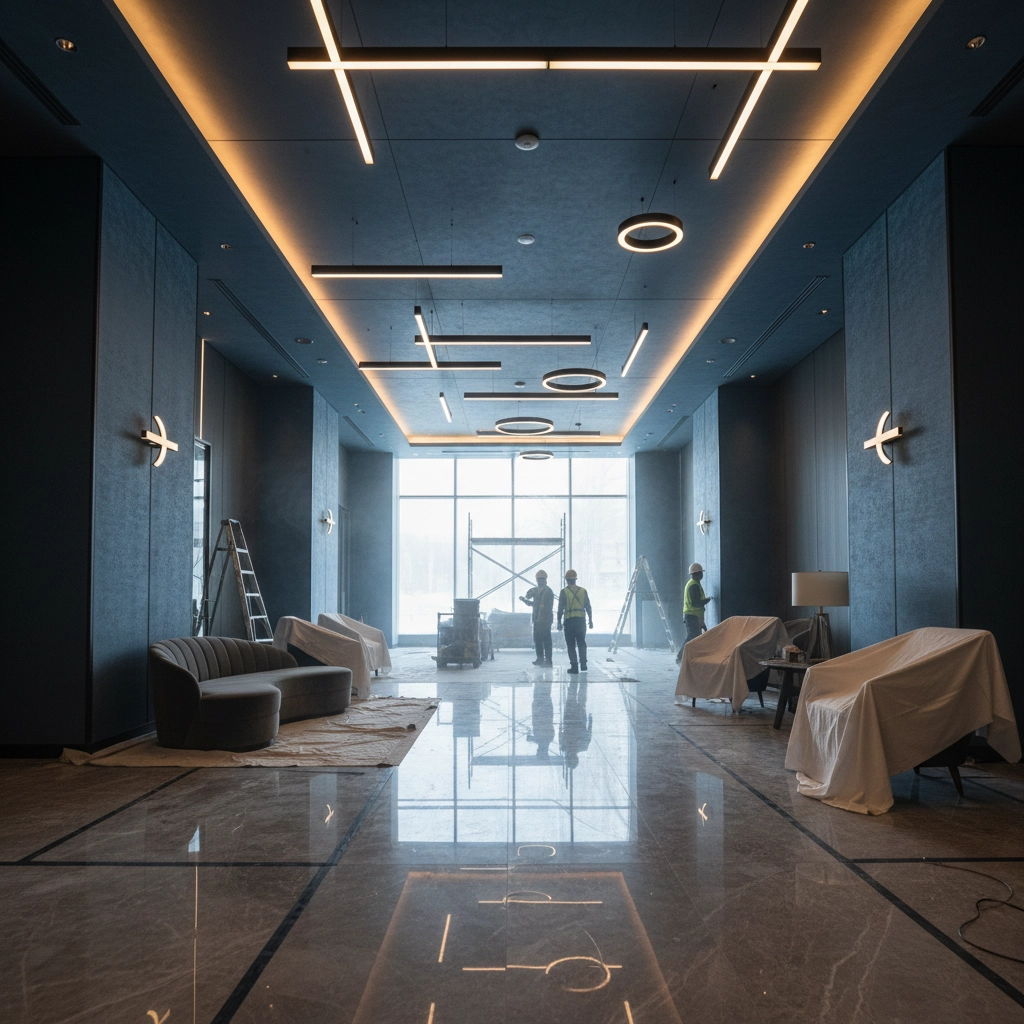Toronto's condominium market is experiencing an unprecedented collapse. With average selling prices down 14% from their peak and construction starts plummeting 88% below the decade average, condo boards across the GTA are scrambling to protect their property values in what TD Economics calls a "historic market correction."
The numbers are sobering: nearly 40,000 unsold units sit on the market, inventory has reached a five-year high of 7.85 months, and experts predict condo prices will fall another 10-15% before stabilizing. For condo boards managing buildings worth millions of dollars, the pressure to maintain property values has never been more intense.
But here's the reality: while you can't control market forces, you absolutely can control how your building weathers this storm. Smart boards are already implementing proven strategies to not just survive this downturn, but position their properties to thrive when the market rebounds.
1. Execute High-Impact Common Area Renovations
Your lobby is the first impression every potential buyer or tenant gets of your building. In a market flooded with inventory, that first impression can make or break a sale.
Focus your renovation budget on spaces that deliver maximum visual impact: lobby modernization, corridor updates, and amenity space refreshes. These improvements don't just look good: they signal to buyers that your building is well-maintained and financially stable.
Consider energy-efficient upgrades during renovations. LED lighting, smart thermostats, and improved insulation reduce operating costs while appealing to environmentally conscious buyers. With carrying costs under intense scrutiny, these improvements provide immediate value to unit owners.

2. Implement Aggressive Preventive Maintenance Programs
Emergency repairs are budget killers, especially when reserve funds are already stretched thin. The most successful boards are doubling down on preventive maintenance to avoid costly surprises.
Establish quarterly building envelope inspections to catch potential water infiltration early: Toronto's freeze-thaw cycles can turn minor issues into major headaches. Schedule annual HVAC deep-cleans and filter replacements to maintain system efficiency and extend equipment life.
Create maintenance logs for all building systems and track performance trends. This data becomes invaluable during budget planning and helps identify systems approaching end-of-life before they fail catastrophically.
3. Strengthen Your Reserve Fund Strategy
With new construction virtually halted and existing buildings becoming increasingly valuable assets, a robust reserve fund isn't optional: it's survival.
Conduct a comprehensive reserve fund study if yours is more than three years old. Market conditions have changed dramatically, and your replacement cost estimates may be severely outdated. Use current pricing for materials and labor to ensure adequate funding.
Consider accelerated reserve contributions while cash flow allows. Many buildings are using current stability to build financial cushions for future uncertainties. This strategy also positions your building favorably with lenders and potential buyers who scrutinize financial health.
4. Optimize Operating Expenses Ruthlessly
Every dollar saved in operating expenses directly impacts your building's competitiveness. With rental income under pressure: one-bedroom rents fell 5% year-over-year in Q4 2024: controlling costs becomes critical.
Renegotiate all service contracts with current market leverage. Vendors are competing aggressively for stable clients, creating opportunities for significant savings on cleaning, landscaping, and security services.
Explore bulk purchasing agreements with neighboring buildings for supplies, utilities, and services. Collective bargaining power can yield substantial cost reductions while maintaining service quality.

5. Upgrade Technology and Building Systems
Modern buyers expect smart building features, high-speed connectivity, and convenient amenities. These aren't luxuries anymore: they're basic requirements for competitiveness.
Install building-wide high-speed internet infrastructure if you haven't already. Poor connectivity is a deal-breaker for remote workers and young professionals who represent a significant portion of the condo market.
Implement smart building technologies like keyless entry, package management systems, and mobile app integration. These improvements enhance security while reducing administrative burden on management and boards.
Consider installing electric vehicle charging stations in parking areas. As EV adoption accelerates, this amenity will become increasingly valuable for attracting environmentally conscious buyers and tenants.
6. Enhance Security and Safety Measures
Security improvements provide immediate tangible value that resonates with potential buyers and current residents. Enhanced safety features often yield insurance premium reductions, providing ongoing financial benefits.
Upgrade access control systems with modern card readers or mobile-enabled entry. Outdated intercom systems and physical keys signal poor building management to prospective buyers.
Improve lighting in common areas, parking garages, and exterior spaces. Better lighting enhances safety while making the property more appealing during evening viewings.
Install or upgrade surveillance systems with modern cameras and monitoring capabilities. While privacy concerns are valid, visible security measures provide peace of mind that translates to property value.

7. Partner with Professional Property Management
With nearly 75% of Toronto condos investor-owned, professional property management isn't just about maintenance: it's about maximizing investment returns during challenging market conditions.
Professional management companies bring economies of scale, vendor relationships, and market expertise that volunteer boards simply cannot match. They understand regulatory compliance, financial management, and maintenance schedules that preserve property values.
Look for management companies with proven track records in Toronto's condo market. They should provide transparent financial reporting, proactive maintenance programs, and responsive communication that keeps unit owners informed and confident.
At GIA Property Management, we've helped Toronto condo boards navigate previous market downturns by focusing on the fundamentals: financial discipline, proactive maintenance, and strategic improvements that preserve and enhance property values.
The Bottom Line: Control What You Can Control
Toronto's condo market correction is creating unprecedented challenges, but it's also creating opportunities for well-managed buildings to distinguish themselves. While you can't control interest rates, immigration policies, or developer behavior, you absolutely can control how your building is maintained, managed, and positioned in the marketplace.
The boards implementing these seven strategies today are the ones that will emerge stronger when market conditions improve. With new construction essentially halted and 31,396 units expected to complete in 2025, existing well-maintained properties with strong governance and financial management will be best positioned to recover value and attract quality buyers and tenants.
The market downturn won't last forever, but the improvements you make today will continue delivering value for decades. Smart boards are using this challenging period to build competitive advantages that will pay dividends when Toronto's condo market inevitably rebounds.
Don't wait for market conditions to improve: start protecting your property values today with proven strategies that work regardless of market cycles.

